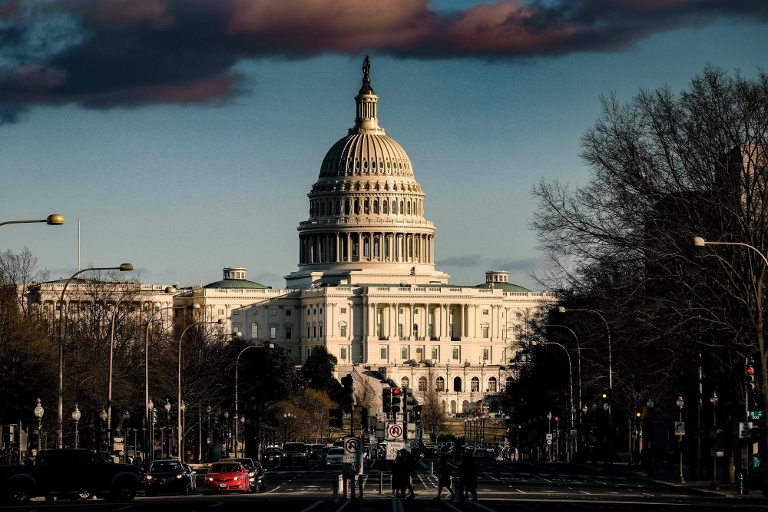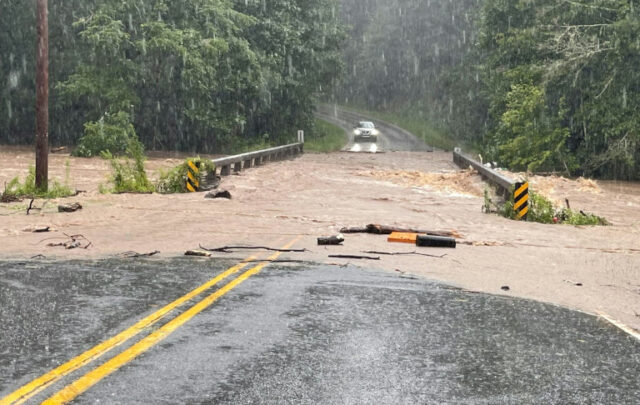Volume 1, September 23, 2019, Issue 29
The new federal fiscal year is a week away. It appears that a continuing resolution (CR) will once again be the answer to Congress’ continued inability to pass spending bills. The CR already passed by the House and now being considered by the Senate will extend government funding through November 21st. Whether Congress giving itself more time will actually result in the passage of the 12 spending bills that makes up the annual appropriation’s package is questionable.
Each day that passes seems to bring up new partisan conflicts that make doing the business of government a near impossibility. The border wall and Trump’s having gone around Congress by issuing a national emergency at the Southern Border and moving $3.6 billion out of the Defense Department’s budget is still sticking in the craw of Democrats and many Republicans—at least those who recognize Trump’s actions trash the constitutional separation of powers.
Other climate-related issues contributing to the partisan divide include drilling off the shores of the lower continental US and in the Arctic National Wildlife Refuge (ANWR). Contrary to the budget agreement made by the White House and Congress to raise federal spending and the debt ceiling that was made before the August recess, Democrats are still looking to add policy riders to appropriations legislation. The Democrats look to the appropriations bills as their only real chance to push back against the actions of the administration that they otherwise have a problem influencing, e.g., opening the Arctic to oil and gas drilling.
CRs keep the government open, but they basically limit agencies to do only what they’ve done the fiscal year before. These days the that can mean only what an agency did five or ten years ago since Congressional gridlock has ruled Capitol Hill for most of the century.
One positive in all of this has been that the drastic cuts the White House has proposed for many climate-related programs, e.g., the Department of Energy’s Energy Efficiency and Renewable Energy Office, have been resisted. Compared to no program, continuing what’s there is a “victory” these days. The problem is the need for expanded programming responsive to today’s circumstances and needs.
The Senate is scheduled to go out on another break at the end of this week. As of now, it looks like the upper chamber will go along with the House-passed CR extending current funding levels in a vote later this week.
The continuing resolution would buy about seven weeks for lawmakers to negotiate final fiscal 2020 spending bills that would most likely move in a single omnibus package just before Thanksgiving. Some Senate Republicans are indicating they would support a CR out to the end of the new fiscal year—ending six weeks before voters go to the polls in 2020.
This week is Climate Week in New York City. Meetings including Monday’s UN climate summit and a host of other meetings during the week will dominate much of the news inside and outside Capital City.
*****
We’ll see. Senate appropriators are aiming to approve funding legislation this week for the Interior Department and EPA by avoiding contentious land and environmental policy issues.
The Senate Interior and Environment Appropriations Subcommittee will mark up its fiscal 2020 bill tomorrow. The full committee will take it up Thursday.
The Interior-EPA measure is expected to provide top-line funding of $35.8 billion, which is about a $200 million increase over current levels but $1.4 billion less than a House-passed version. It would reject many of the steep cuts for environmental programs sought by the White House.
The legislation has been one of the more contentious of the 12 spending bills, but Senators Lisa Murkowski (R-AK) and Tom Udall (D-NM), the subcommittee’s chairwoman and ranking member, said last week that they were trying to defuse tensions over “poison pill” riders.
24/7. Legislation to bolster the Department of Energy’s research and development of long-term energy storage technologies leads a slate of 21 bills under consideration during a Senate Energy and Natural Resources Committee markup this week.
The measure, S. 1602, from Sen. Susan Collins (R-ME) and others, is likely to provide the back-bone of the committee’s broader effort to form a legislative package on energy storage and battery technology.
That package would combine multiple proposals floating across the Senate to infuse additional research dollars into the R&D effort.
Chairwoman Lisa Murkowski (R-AK) said before the August recess she was aiming to put forth some type of package in early fall. (E&E News)
The development/advancement of storage and battery technologies is one of those things on which Republicans and Democrats can agree.
See, see rider. A House Natural Resources subcommittee will debate legislation (H.R. 4348) aimed at overturning the Trump administration’s changes to Endangered Species Act rules.
The Interior Department changed protections to threatened and endangered species, and critical habitat by including economic impact in the decisionmaking process and reducing the Fish and Wildlife Service’s ability to also provide species with protection. (E&E News)
Being politic is not enough. The excerpted article is an opinion piece by former Secretary of State John Kerry.
Since the Paris agreement was adopted, climate analysts have argued that the initial commitments made by more than 185 countries were insufficient to reach the agreement’s goals in fighting climate change. That’s true, but partly by design. The agreement was structured first to get countries to buy in and then to increase their ambition in five-year intervals; 2020 is the target date for the first round of more influential climate plans.
In recent joint statements with France, both India and China indicated they would update their national climate commitments “in a manner representing a progression beyond the current one and reflecting their highest possible ambition.” They also announced they would submit strategies next year for the essential task of cutting emissions over the long-term, also called for under the Paris Agreement. (Washington Post)
Only time will tell what in a manner representing means to India and China.
Time will also tell whether a denialist US president whose administration peddles coal at climate conferences will provide the excuse other nations are looking for to limit their actions.
Hypocrisy? California has filed suit against Trump for having rescinded its waiver under the Clean Air Act to set a more strident fuel efficiency standard than the federal government. It’s the sixtieth suit by California against the Trump.
It’s a fight that California has to win. Cars, trucks, and buses are America’s largest contributors to global warming, and California has the largest auto market in the United States. The reason the state has been aggressive on tailpipe emissions is not that it is the home to countless Tesla-driving eco-snobs but because it is the place where the problem first presented itself most acutely. The toxic coincidence of sunshine, cars, and mountainous terrain meant that by the late nineteen-sixties California’s air quality was the worst in the United States. Now, of the country’s ten most-polluted metropolitan areas, seven are in California. (The New Yorker)
Red-state Republicans blasted Obama’s Clean Power Plan for usurping state authority.
There have only been two times since California’s Clean Air Act waiver has been suspended—both times by a Republican administration—Geo W. Bush and Donald Trump.
The facts say otherwise. Speaking to auto workers in Michigan two years ago, President Donald Trump pledged that his administration would review and revise ill-considered fuel economy regulations from President Barack Obama’s administration.
Those regulations made it too expensive for American families to buy safer, newer cars and light trucks. Average Americans simply cannot afford the vehicles they need to pursue their livelihoods and care for their families.
So, over the past two years, our teams of experts at the NHTSA, the U.S. Department of Transportation’s National Highway Traffic Safety Administration, and the EPA, the U.S. Environmental Protection Agency, conducted a long, thoughtful, transparent and detailed review of our nation’s fuel economy standards. And the public helped by providing more than 600,000 comments on SAFE; the Safer Affordable Fuel-Efficient Vehicles Rule that we proposed last August.
The administration’s telling of the situation is just wrong when it comes to the price, safety, and affordability of automobiles that would and will meet the higher fuel efficiencies of the Obama era rule.
The auto industry asked for flexibility in meeting the higher standard—not a lower standard.
The majority of the 600,000 comments received in response to the draft rule opposed it.
Four automakers have agreed to meet the higher California standard and are now being investigated by the Trump administration’s Department of Justice for potential anti-trust violations in hopes of keeping other automakers from joining in the voluntary agreement with California.
Investigating the investigators? Judiciary Committee Chairman Jerrold Nadler (D-NY) and Rep. David Cicilline (D-RI), the chairman of the panel’s antitrust subcommittee, questioned the administration in a letter to the White House and the Department of Justice (DOJ) on Friday.
It appears they do mean business. We Mean Business, a coalition of climate advocacy groups, announced in advance of the UN meeting in New York that companies including Nestlé, L’Oréal, and French building material manufacturer Saint-Gobain agreed to cut emissions to net-zero by 2050. (The Hill)
In the audience. Among the first countries to appear at the summit meeting on Monday will be India. The vast majority of its electricity comes from burning coal, and it continues to develop new coal mines and new coal-fired power plants, often with state subsidies, even as it ramps up renewable energy. (New York Times)
India was allowed to speak because of its intention to undertake ambitious climate-defense actions, although most of its electricity is currently produced by coal-fired units.
United Nations Secretary-General Antonio Guterres had indicated that nations unwilling to take aggressive action, would not be allowed to speak—which is why the US along with Australia, Japan, and other countries were snubbed.
Stopping in to hear Prime Minister Narendra Modi’s speech was his newest fanboy—Donald J. Trump. Trump and Modi addressed 50,000 Indian-Americans in Houston on Sunday.
Trump stayed for 15 minutes this morning and then went on to other meetings—so began and ended the Trump administration’s participation in the UN Climate summit.
Not at all surprising. On September 18 and 19, as the Swedish teenager and climate activist Greta Thunberg met with lawmakers, House Minority Whip Steve Scalise (R-LA)., hosted fundraisers with oil and gas lobbyists to raise cash for the Scalise Leadership Fund, a political action committee used to dole out cash for battleground House races across the country. The fundraiser invites were obtained by The Intercept and Documented. (The Intercept)
Also, not surprising. A new HuffPost/YouGov poll has found that a significant generational divide within the GOP: 69 percent of Republicans under age 45 describe themselves as at least somewhat concerned about climate change, compared to just 38 percent of those age 45 and older. There’s not a similar difference based on age among Democrats.
Nations in need. The Green Climate Fund (GCF), a flagship United Nations entity set up in 2010 to help vulnerable nations ward off and adapt to the effects of climate change.
A decade after that Copenhagen summit, arguments still rage over whether the $100-billion goal is close to being met — partly because negotiators never agreed what kind of financing counts. Some estimates include loans and private finance leveraged by public money, for instance, whereas others say only direct grants, a much smaller sum, should be included.
A rethink of these spending targets is coming. This year the GCF, which was pledged an initial $10.3 billion and is running out of money, needs wealthy nations to refill its coffers. Countries are now discussing a new promise to low-income nations, something that they have committed to deciding before 2025. (Nature)
Island nations are on the frontline of destruction from rising sea waters caused by climate change—for which wealthy developed nations are a major cause.
The GCF and other issues impacting at-risk nations will be topics of discussion during the UN meeting. It’s unclear whether any substantive action will flow from the dialogues.
A corny idea. President Trump has told senators he favors limiting prices on biofuel credits to help petroleum refiners, according to an industry source briefed on yesterday’s White House meeting.
Trump’s support for a 10-cent limit on prices of renewable identification numbers — the credits that act as a currency for the renewable fuel standard — could satisfy refiners who oppose his related move to boost the amount of ethanol blended into gasoline. An announcement on those policies could come any day, according to industry groups and lawmakers.
Refiners oppose any increase in biofuel volumes, while ethanol groups say the exemptions have undercut demand for biofuel and contributed to the idling of some biofuel facilities in recent weeks.
Economists at Iowa State University projected last year that capping RIN prices between 10 cents and 25 cents would reduce consumption by around 700 million gallons, the Renewable Fuels Association said.
An excellent idea. Presidential hopeful Andrew Yang said he would consider tapping former competitor Washington Governor Jay Inslee to serve as a climate czar in his administration.
The pressure got to him. EPA is dropping plans to issue a final version this year of its divisive plan to limit the agency’s use of scientific studies in crafting major new regulations; Administrator Andrew Wheeler indicated at a congressional hearing.
Instead, the agency will issue a supplemental proposal early next year, Wheeler told members of the House Science, Space, and Technology Committee, adding that it will apply only to future rulemakings.
However, he again defended the agency’s initial rationale for requiring only studies for which underlying data are available for “independent validation.” (E&E News)
The proposed rule would have prohibited the use of research studies involving health and other protected and proprietary information, e.g., involving medical records.
Can they do that? The Federal Regulatory Energy Agency approved a proposal to change a 1970s law designed to promote renewable energy after the Arab oil embargoes.
The short-handed commission, which is down two commissioners, approved the changes to the Public Utility Regulatory Policies Act of 1978, or PURPA, thanks to its two Republicans, chairman Neil Chatterjee, and commissioner Bernard McNamee. FERC’s sole Democrat, Richard Glick, issued a partial dissent on the vote, arguing that the agency does not have the authority to make wholesale changes to the law. Proposals to alter the law have failed to pass in Congress. (Washington Examiner)
Money talks. More than 500 major institutional investment firms managing what they said are a collective $35 trillion in assets called on countries to increase their efforts to address climate change by expediting the shift away from fossil fuels and pricing carbon emissions so that the world can avoid the disastrous economic consequences of an “unacceptably high-temperature increase.” The investors, which include Toronto, Canada-based Manulife Financial Corp. and Insight Investment in the United States, said they are concerned about an “ambition gap” between governments’ pledges for action and the steps they have taken to date. (The Associated Press)
Halving emissions. Greenhouse gas emissions could be halved by 2030 if a small number of trends and renewable energy technologies are adopted more widely, according to a report by an international group of experts. (The Guardian)
Trump needles San Francisco. President Donald Trump said the Environmental Protection Agency would act within a week to cite the city of San Francisco over environmental violations related to ocean pollution stemming from what he said is the city’s homelessness problem. San Francisco Mayor London Breed (D) countered that filtration at wastewater treatment sites keeps the city’s debris from reaching the bay or the ocean. (The New York Times)
Bolivia is burning. Fires have consumed more than 12,000 square miles of forests and grasslands in just over a month in Bolivia, according to an environmental group, with the blazes affecting the South American country’s Amazon region.
The Friends of Nature Foundation said the burned area is the size of Switzerland and its estimates are based on satellite images. In its report, it said that since January fires have burned 4.1 million hectares (15,800 square miles), including 3.1 million hectares since farmers and ranchers began burning pastures in August.
Authorities in Bolivia say farmers and ranchers start fires to renew pastures and clear land, but the blazes got out of control this year due to a drought and strong winds that the government attributes to climate change. Critics say a decree issued by Morales’ government in July allowing controlled burns for agricultural purposes contributed to the disaster.
Thousands of soldiers, police, and volunteers are battling the blazes, along with two firefighting tanker planes from the United States and Russia. (Associated Press)






